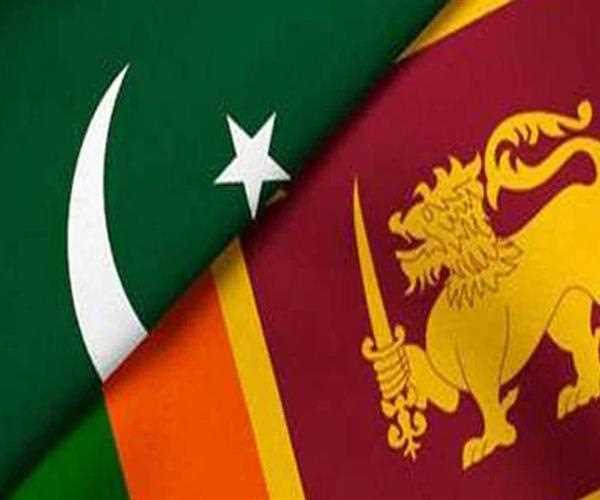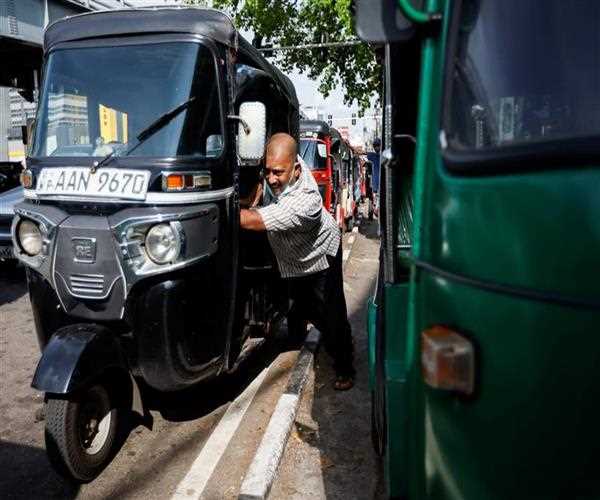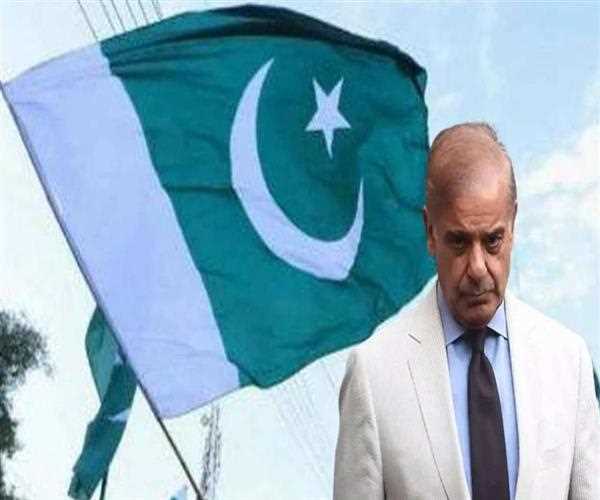
28-Jun-2022 , Updated on 6/28/2022 7:08:12 AM
Pakistan and Sri Lanka are towards their economic crash amid high inflation
Negative news from two of our most significant neighbors, Pakistan and Sri Lanka, are now competing with the Ukraine-Russia conflict on our front pages and television screens.
Two nations in our region, both highly significant to India for separate reasons, are now experiencing a serious political and economic crisis.
For the simple fact that all economics, including in non-democracies, is ultimately anchored in politics. Even in imperfect democracies, such as Pakistan and Sri Lanka, economics emerges from politics.
So, let's start with Pakistan. What is going on in Pakistan?
Pakistan's per capita income has been declining. Its fiscal shortfalls have increased. Pakistan's foreign currency reserves have been dwindling. They are now responsible for paying for a few weeks' worths of imports.
Pakistan has been in desperate need of IMF assistance. Again, this is common between Pakistan and Sri Lanka, both of whom are in desperate need of an IMS bailout.
In Pakistan's instance, the IMF has recently announced that the program would be suspended. 'Let Pakistan have a decent, stable administration.' In Sri Lanka, the government is now under attack.
As we speak, the Gotabaya Rajapaksa administration has lost its parliamentary majority since many members of its party have left, claiming that they cannot be a part of this kind of rule.
So, how awful are the conditions in both countries?
This sequence of tweets by Prof. Sharma Azar of Bucknell University provides me with some information, wisdom, and facts.
He provides facts to demonstrate Imran Khan's poor economic management. If you look at the evolution of Pakistan's per capita GDP over the last almost two decades, you will see that it has typically increased just a little year after year.
GDP seems to have been in a fast collapse for the previous four years, and these four years are critical because Imran Khan came to power in 2018, specifically in the middle of 2018.
The so-called umpires, the lads, or the supervisors at GHQ were throwing out Nawaz Sharif because they wanted them to put Imran Khan instead.
As you can see, the economic slide began then, and it has been a free fall ever since, and it has not been a one-year free fall. But in this situation, it's almost like a free slide, and you can see that under Imran Khan, Pakistan's per capita GDP has already lost about one-third of its value in three and a half years, and he's only been in office for four years.
That is a precipitous drop, Pakistan is unaccustomed to it. This has never occurred in the history of Pakistan. That is, first and foremost, what is causing major problems in Pakistan.
At the same time, if you look at the graph below from Professor Azar, you can see that inflation is rising, and here is a more in-depth examination of who is most affected by inflation.
Because inflation affects everyone, you can see the two lines there. The red line represents the poorest individuals, the lowest quintile. As a consequence, inflation is a major source of anxiety for them.
I suppose it's because food inflation is the highest in Pakistan. That includes edible oil, sugar, atta, wheat, flour, and other goods of a similar kind.
These have all increased significantly, while currency depreciation has occurred at a rate that is neither typical, orderly, or beneficial.
If the currency depreciates somewhat, your exports will benefit. Your exports benefit because you become more competitive. Your exporters' competitiveness improves. In this case, though, the currency has been in free collapse.
Pakistan's rupee was valued at approximately 118 to the dollar when Imran took power in 2018, and it is now worth roughly 180 to the dollar. As a result, this is a fairly steep drop.
A currency, especially in a developing nation, should fall in value. It is beneficial for the currency to degrade or devalue as a result of the inflation rate disparity between that nation and the country that issues the dollar, America.
So, if America has 2% inflation and you have 8% inflation, your currency should decline by around 6%. However, this is a significant devaluation that contradicts any economic or political economy theory.
Then consider the stock market. That is the second stock market, and Hussain has been pointing out that even after three and a half years of Imran Khan's stock market, i.e., the Karachi Stock Exchange, KSE, has yet to achieve the level it attained in 2017.
So, after five years, the stock market hasn't even recovered to where it was in 2017. That indicates that there is a problem. In reality, the KSE was over 52,000 in 2017, and it is now at 44,000.
So, it also reflects the picture of the more severe economic deterioration, and as you can see, the trade imbalance is increasing.

What action has the government taken?
Instead of attempting to punish it, the government has lavished it with subsidies. Then Imran Khan announced a proposal in which he said that a significant number of people, ostensibly impoverished people, could go to local grocery stores and purchase sugar, atta, edible oil, and other items at a 30 percent discount, which the government would pay for.
How would the government pay now that it is already bankrupt?
The government was already discussing conditions with the IMF and providing substantial subsidies for fuel, gasoline, and diesel. As a result, when converted to dollars, fuel and diesel in Pakistan are substantially cheaper than in India.
Now, if the government there believes they can afford it, that's fine, but the truth is that they can't. So here is a leader with strong authoritarian inclinations who refuses to listen to anybody.
And it is here that Pakistan's economic tragedy has resulted from the confluence of severe populism, authoritarian solid inclinations, and religion-fuelled nationalism. Let us now see who can reassemble it.
If you believe Pakistan is wrong, look at what's going on in Sri Lanka.
People are now taking to the streets because the situation has deteriorated. Just the other day, this Sri Lankan government wielded authoritarian authority. The biggest blunder that Raj Pakshas did was converting all of Sri Lanka's agriculture to organic techniques and prohibiting the use of pesticides, insecticides, and other chemicals.
He had declared a national emergency and selected a major general from the army at that moment. As Sri Lanka has a large number of spare generals, so saving one major general meant nothing, and that big general was then intended to go after holders, black marketeers, and so on.
But why were they imprisoned in the first place? They were held back due to a lack of supplies. What was the purpose of the black market?
Because basic items were scarce, there existed a black market, thus holding was lucrative. That also occurred in the face of strong populism, dictatorial inclinations, and dictatorial power much greater than Imran Khan ever had in Pakistan.
As a result, the Rajapaksa clan had almost complete control in Sri Lanka. They held five government roles, including the president, prime minister, and finance minister. So, they had complete control over everything, and they now had the authority to behave like tyrants.
As a result, they altered the constitution, known as the 20th amendment in Sri Lanka, giving their president vast powers. It even empowered the president and the government with the authority to remove and appoint judges. As a result, they destroyed all of their institutions, and the situation is now dire.
The government's reputation is so low that even the previous finance minister (who happens to be the president and prime minister's brother), departed, or was forced to go.
Ali Sabre was the newly appointed finance minister. He resigned within 24 hours, probably thinking he'd been given this dried lemon and ordered to produce orange juice out of it, which wasn't going to happen. As a result, he has also resigned.

What is the current scenario in Sri Lanka?
The fact that the Sri Lankan rupee went from 199 to 235 to the dollar overnight due to the government's dumb actions, such as restricting certain trading.
They used to have a fairly open economy, and Sri Lanka had an economy similar to that of Singapore. Not long ago, it was almost like a 'tax haven'. However, when the government abruptly imposed totalitarian currency restrictions, there was a run on the Sri Lankan rupee, which fell from 199 to 235 to the dollar overnight.
Within six months, it has fallen to 360 to the dollar and is still falling. As a result, when items are imported, they are done so on letters of credit.
Though those letters of credit are calculated in dollars, by the time the goods arrive and you pay for them, your letters of credit have been cashed, the value of a dollar has changed, and you don't have enough money to pay your banks.
That is the trap Sri Lanka is now stuck in. The Sri Lankan government's borrowing and expenditure as a proportion of GDP is roughly 124 percent, which is unsustainable; yet, they have been negotiating with the IMF and so lie about the situation.
So, I'm also relying on an essay by Professor R. Ramkumar of the Tata Institute of Social Sciences for a lot of the analysis and statistics on Sri Lanka or the Sri Lankan economy.
The piece was published in the Hindu, and he claims that one of the reasons Sri Lanka went wrong was because it followed the IMF's instructions, which I disagree with. After all, nothing in Sri Lanka's track record indicates that it followed the IMF's recommendations.
It agreed to such terms but did not follow through on them. For example, the first bailout required a 2.6-billion-dollar investment. 2.6 billion US dollars is a large sum of money for Sri Lanka, whose overall GDP is presently at 82 billion.
As you may imagine, the war had recently broken out in the north of Jaffna in 2009. The LTTE had only recently been defeated. Sri Lanka required funds. They committed to reducing its budget deficit to 5% of GDP by 2011.
Another election was held. New populist pledges were made by the new people. They returned to the IMF in 2016 and stated, “Look what happens when the loan fails. You extend me a fresh loan. So, in return for agreeing to cut my deficit to 3.5 percent of GDP by 2020, you give me another 1.5 billion dollars.”
Is there a drought in Sri Lanka right now?
It represents 10% of Sri Lanka's GDP, hence no one followed the IMF's terms. Sri Lanka has completely violated those requirements.
How did everything go so wrong?
Raja Pakshas had been deposed, and the alliance had taken control. So they reasoned when a new election was held, now, appropriately promise the moon. People merely look at what you promise and then pay their bills.
On the other side, the Rajapaksa’s pledges were so vast, costly, and unaffordable that the normal thing that politicians envisaged didn't happen: “let me spend now and gain votes, and maybe my successor or my children's generation will pay for it later.”
This was so pricey that they are still paying for it. They have been reduced to a minority, and what have they promised? First and foremost, they said, 'I will reduce my GST by half.' As a result, the 15% GST in Sri Lanka has been reduced to 8%.
The IMF has mentioned; “They recommended that you should strengthen your tax collection and management.” In this case, the tax administration was weakened, and massive tax cuts, even on income, were granted.
If you pay income tax, the threshold has been increased from five lakh Sri Lankan rupees per year to thirty lakhs. Thus, the number of registered taxpayers in Sri Lanka declined by 33.5 percent in a year.
This is from Dr. Ram Kumar's essay, and he also claims that the overall tax loss to Sri Lanka was equal to 2% of GDP throughout this phase. Finally, that is a significant sum of money.
What else did the Rajapaksa accomplish?
They, too, believed in this pseudo-science. So, whoever offered him this idea believed that if he executed it in a severe manner, he would get broad applause, particularly from EU nations.
'Fantastic, I've suddenly climbed to worldwide status,' he thought. This is the second issue that dictators who are also effective populists face.
They want worldwide recognition and global adoration. When he spoke at the United Nations on climate change, he felt he was receiving this acclaim from the western world, but he strengthened it by declaring Sri Lanka will now set an example for the rest of the world.
As he imported more, his deficit grew; as his deficit grew, so did his currency; as his currency weakened, so did the Sri Lankan rupee cost of his imports; and as inflation grew, it is now around 19 percent in Sri Lanka.
We're terrified about double-digit inflation. It's 19 percent and increasing, but at what rate? It was 15.1 percent in February, 18.7 percent in March, and still rising. So, it is expanding at that pace. So, the Sri Lankan economy is now locked in a vicious spiral, which is also dragging down politics.
And, in the midst of all of this, what is Sri Lanka's food inflation? It stands at 30.1 percent. So, we said extreme populism with dictatorial methods and religion-laden nationalism in Pakistan.
In the case of Sri Lanka, it is radical populism, a powerful elected dictatorship, a severe lack of intellect or understanding, and an inability to listen to anyone unless they are the wrong kind of people.

Student
Economics can be broken down into microeconomics, which looks at individual decisions, and macroeconomics, which is concerned with the economy as a whole. Both types of economics utilize historical trends and current conditions to inform business decision-making and make predictions about how markets might behave in the future. Students who choose to study economics not only gain the skills needed to understand complex markets but come away with strong analytical and problem-solving skills.
Comments
Join Our Newsletter
Subscribe to our newsletter to receive emails about new views posts, releases and updates.
Copyright 2010 - 2026 MindStick Software Pvt. Ltd. All Rights Reserved Privacy Policy | Terms & Conditions | Cookie Policy